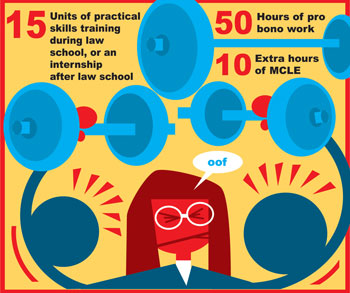Task force finalizes practical
skills proposal
By Psyche Pascual
Staff Writer
After more than a year of
drafts, revisions and public hearings, a task force has sent to the State Bar’s
Board of Trustees a far-reaching proposal geared towards improving the
practical skills of new lawyers.
 The 22-member State Bar Task Force on Admissions Regulation Reform unanimously approved the draft
proposal on June 11, but it still requires the Board
of Trustees’ approval and possibly also the California Supreme Court before it
is implemented. The board has asked that public comments be submitted on the proposal before Sept. 5.
The 22-member State Bar Task Force on Admissions Regulation Reform unanimously approved the draft
proposal on June 11, but it still requires the Board
of Trustees’ approval and possibly also the California Supreme Court before it
is implemented. The board has asked that public comments be submitted on the proposal before Sept. 5.
If adopted by the full board,
it would be the most sweeping set of new requirements for new lawyers recently
adopted by the bar. It will also require the cooperation of not only the bar,
but law schools, legal service organizations and possibly local bar
associations for its implementation.
State Bar officials maintain
that the proposal will better prepare law school graduates to compete in a dismal
job market that has lost thousands of positions in recent years. Many also face
mountains of debt after graduation.
“We want to better prepare
lawyers to face the challenges and reach the potential that brought them into
law school in the first place,” State Bar President Patrick M. Kelly said.
Jon Streeter, the task force
chairman and former State Bar president, said as the largest bar in the nation,
California is at the forefront of making changes to its admissions standards that
may ripple across to other state bars.
“What we are doing is
profoundly important because of the size of our bar and the statement we’ll be
making about better preparation of lawyers as they enter the profession,” he
said.
The proposal moves on to the
Regulation, Admissions and Discipline Oversight Committee of the Board of
Trustees. Under the proposal, new attorneys would have to complete several
levels of training that would offer them real-life skills to work as a lawyer,
such as negotiating, counseling and problem-solving with clients, budgeting and
managing a practice. They include:
- 15 units of competency skills training
during law school or participation in an internship or clerkship
- 50 hours of legal services devoted to
pro bono or modest means clients, either before or after admission. Under the
proposal, lawyers would have up to a year after admission to complete the
requirement.
- 10 extra hours of Minimum Continuing
Legal Education (MCLE) after admission, specifically focused on competency
skills training
Before finalizing the
report, members of the task force agreed to make additional changes, but there
are still many more details to iron out before the plan is implemented.
The panel, made up of attorneys,
judges, academics and State Bar officials, has heard dozens of hours of public comments
over the past year, including from those critical of the plan. Some speakers at
the June meeting questioned the bar’s ability to implement the pro bono requirement,
pointing out that new lawyers would need supervision, monitoring and regular
mentoring to make sure they learn the proper skills.
Anna Davis, director of
public interest programs at the University of California at Irvine School of
Law, said that 90 percent of UCI law students already do pro bono work.
However, there are few legal service agencies near the university that would have
the resources to supervise students’ pro bono work.
Doing work for a for-profit
legal firm may not solve the problem, Davis said, since state and federal labor
regulations would prevent law students from performing unpaid labor if their
employer is paid for its work.
Many law schools, Davis
added, do not allow so-called “double-dipping,” which is when students get
academic credit while getting paid as interns and clerks.
In a June 10 letter to the
task force, Katherine Kruse, president of the St. Paul, Minn.-based Clinical
Legal Education Association (CLEA), a group that represents law school
academics, insisted that the 15-unit requirement for law students did not go
far enough in promoting practical skills. She urged the task force to increase
it to 21 units.
In an amendment to the
proposal, the task force authorized a change that would give law schools
the ability to credit portions of courses that first year students take towards
the required 15 units of competency skills, provided that the courses offer
some sort of advanced skills training.
The proposal is still open
to revision. If the full Board of Trustees adopts the proposal, it would still
have to go through a smaller committee of the task force to work out many of
the details and who would be responsible for regulating it. Still, task force
chairman Streeter said he is proud of the group’s work.
“So many people have come in with critical comments,
but also support for what we’re doing,” Streeter said. “While one can quibble
about some of the details, I’m more convinced than ever about what we’re
doing.”